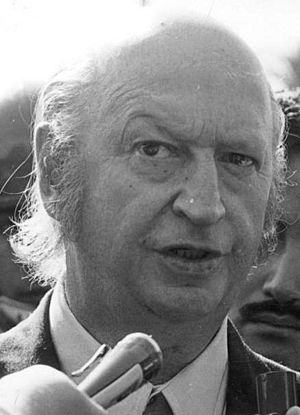Volodia Teitelboim facts for kids
Volodia Teitelboim Volosky (born Valentín Teitelboim Volosky; March 17, 1916 – January 31, 2008) was a Chilean Communist politician, lawyer, and writer. He was known for his important work in politics and literature.
Early Life and Family
Volodia Teitelboim was born in Chillán, Chile. His parents were Jewish immigrants from Ukraine and Bessarabia. From a young age, he loved reading and writing. He studied law at the University of Chile. His final project was about the start of capitalism in America.
When he was 29, Volodia married Raquel Weitzmann, who was also a law student. They had a son named Claudio. Volodia took care of Claudio, even though his work with the Communist Party often kept him away or led to him being held in prison. Their marriage ended in 1957. Volodia then raised Claudio on his own. Later in life, Claudio learned more about his family history and changed his last name to Bunster. However, it was reported that Volodia and Claudio became close again before Volodia passed away.
Volodia married a second time when he was 51, to Eliana Farías. While they were living away from Chile in Moscow after a big political change in 1973, they raised Eliana's son, Roberto Nordenflycht, and their own daughter, Marina. Sadly, Roberto died in 1989. This sad event led to the end of Volodia's marriage to Eliana. Marina grew up to work in diplomacy, which involves dealing with international relations.
Volodia Teitelboim died on January 31, 2008, in Santiago, Chile. He passed away from kidney failure caused by a type of cancer called lymphatic cancer.
Political Journey
Volodia Teitelboim joined the youth group of the Chilean Communist Party when he was just sixteen. In the 1940s, he and other members of the Communist Party faced difficulties and he was held in Pisagua because of a law called the "cursed law."
In 1961, he was chosen to be a Deputy in Congress for Valparaíso and Quillota. He held this position until 1965. Then, he was elected as a Senator for Santiago. He was re-elected in March 1973. However, he could only serve for a short time because Congress was closed after the military takeover on September 11, 1973.
During the time when Gen. Augusto Pinochet was in charge of the military government, Volodia Teitelboim lived away from Chile in Moscow. There, he started a radio show called Escucha, Chile ("Listen, Chile"), which was broadcast twice a week. Even though it was risky, he secretly returned to Chile in 1988. He worked to support a temporary government after the military government lost a vote that year. The next year, he became the president of the Communist Party and stayed in that role until 1994.
Literary Achievements
Volodia Teitelboim was a very talented writer. He received Chile's National Prize in Literature in 2002, which is a very important award. He also won the Literature prize at the Floral Games in 1931. His writings often included his own memories, life stories of others, and essays about literature.
His first book, Antología de poesía chilena (Anthology of Chilean Poetry), was published in 1932 with Eduardo Anguita. It collected poems from great Chilean poets. Later, he said that the book made some mistakes, like not including Gabriela Mistral and focusing too much on arguments between poets like Vicente Huidobro, Pablo de Rokha, and Pablo Neruda.
He wrote a series of books about his memories, including Un muchacho del siglo XX (A Boy of the Twentieth Century, 1997), La gran guerra de Chile y otra que nunca existió (The Great War of Chile and Another That Never Existed, 2000), and Noches de radio (Radio Nights, 2001). These books tell the story of Chile's 20th century from a political and social point of view.
Volodia Teitelboim was especially known for writing biographies, which are life stories of famous people. He wrote about Jorge Luis Borges, Vicente Huidobro, and his most praised works were about Pablo Neruda and Gabriela Mistral. He is often considered part of the Chilean "Generation of '38," a group of writers from that time.
Published Works
- Antología de poesía chilena (Anthology of Chilean Poetry) - 1935
- El amanecer del capitalismo. La conquista de América (The dawn of capitalism. The conquest of America) - 1943
- Hijo del salitre (Son of saltpeter) - 1952
- La semilla en la arena. Pisagua (The seed in the sand) - 1957
- Hombre y hombre (Man and man) - 1969
- El oficio ciudadano (The duty of the citizen) - 1973
- El pan de las estrellas (The bread of the stars) - 1973
- La lucha continúa, pólvora del exilio (The struggle continue, powder from exile) - 1976
- Narradores chilenos del exilio (Chilean storytellers from exile) - 1978
- Neruda - 1984
- La palabra y la sangre (The word and the blood) - 1986
- El corazón escrito (The written heart) - 1986
- En el país prohibido (In the forbidden country) - 1988
- Gabriela Mistral, pública y secreta (Gabriela Mistral, public and secret) - 1991
- Huidobro, la marcha infinita (Huidobro, the infinite march) - 1993
- Los dos Borges (The two Borges) - 1996
- Un muchacho del siglo XX (A Boy of the 20th Century) - 1997
- Notas de un concierto europeo (Notes from a European concert) - 1997
- Voy a vivirme (I am going to live myself) - 1998
- La gran guerra de Chile y otra que nunca existió (The great war of Chile and another which never existed) - 2000
- Noches de radio (Nights of radio) - 2001
- Ulises llega en locomotora (Ulysses arrives in a locomotive) - 2002
See also
 In Spanish: Volodia Teitelboim para niños
In Spanish: Volodia Teitelboim para niños


